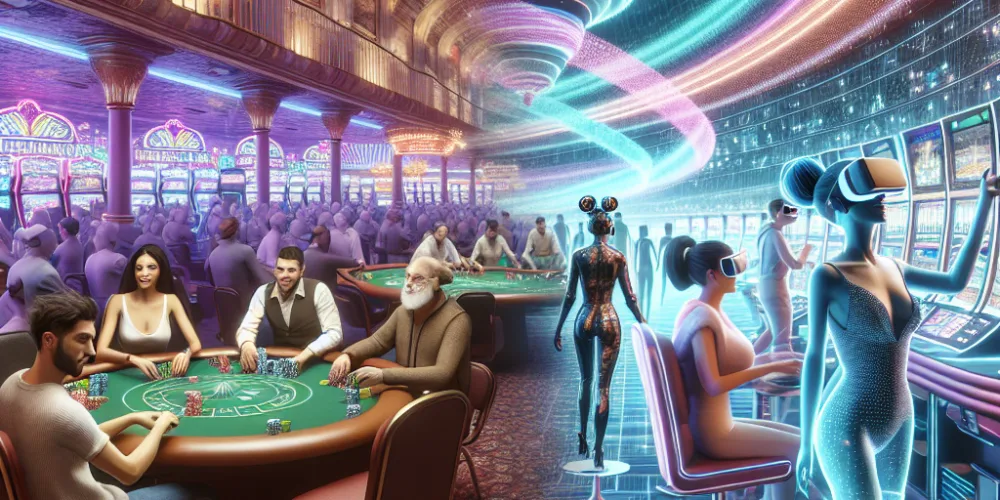In recent years, the gambling industry has witnessed an unprecedented transformation, thanks largely to technological advancements. One of the most notable shifts has been the introduction and integration of virtual reality (VR) technology in casinos. This merging of VR with casino gaming promises to revolutionize how players engage with gambling activities, offering an immersive experience that was once the stuff of science fiction.
Virtual Reality technology in the gaming world has extended its roots deep into the casino sector, creating a new genre of entertainment called Virtual Reality Casinos. These platforms allow players to experience a three-dimensional environment where they can play games like blackjack, roulette, and slots in a way that closely mimics playing in a physical casino.
The Technical Backbone
The core of a virtual reality casino is its heavy reliance on VR hardware. Players need a VR headset and sometimes additional hardware like controllers to interact with the game. The market leaders in VR technology, such as Oculus Rift, HTC Vive, and Sony PlayStation VR, have made significant strides in enhancing user experience, offering more refined visuals and sensitive motion detectors, thus enriching the overall engagement of players.
The Gaming Experience
When players don a VR headset, they enter a fully designed casino floor replete with slot machines, gaming tables, and other typical casino elements. The realism is profound; players can move around, interact with other players’ avatars, engage with live dealers, and observe game outcomes in real time. This level of interaction not only enhances the thrill of the game but also adds a social element that is often missing in online gambling.
VR Casinos Today
Several online casino operators have ventured into VR to provide more captivating and interactive experiences. One such example is SlotsMillion, the first-ever VR casino which launched with a modest number of 40 games and has continued to expand. This platform allows users to walk into a casino with multiple floors, where they can choose slots or game tables to play.
Another pioneer, Casino VR Poker, provides a full-body immersive experience where players can study opponents’ body language and interact at the table just like in a real-world tournament. The platform has focused on creating a realistic and social environment, emphasizing the communal aspect of poker.
The Advantages of VR Casinos
The main advantage of VR casinos is the enhanced user engagement and immersion that cannot be matched by traditional online casinos or even many land-based establishments. This technology allows for a level of interaction that mimics real life, making it possible for players to lose themselves in the game, just as they might in Las Vegas, Atlantic City, or Monte Carlo.
Furthermore, VR is a boon for those who live in areas where gambling is restricted, as it offers the thrill of a casino without any legal implications. It also offers accessibility – those who cannot travel to a casino because of physical limitations can now enjoy the full experience from the comfort of their homes.
Looking Forward
The future of VR casinos is promising but also comes with challenges. The high cost of VR equipment and the robust system requirements (such as high-end graphic cards and fast processing speeds) needed to run VR software prevent it from being accessible to the wider public. However, as technology advances and becomes more affordable, these barriers are likely to lessen.
Moreover, regulatory frameworks in the VR gambling sphere are still in nascent stages. As virtual reality casinos continue to grow, regulatory bodies will likely catch up, establishing rules that safeguard players while ensuring that the games are fair and transparent.
Conclusion
As we advance further into the 21st century, VR casinos are set to transform the gambling industry dramatically. With continuous technological enhancements and increasing global interest in VR, these virtual platforms are poised not only to replicate but potentially to surpass the thrill and social interaction of traditional gambling houses. For enthusiasts and casual players alike, the age of VR casinos promises an exciting blend of technology, entertainment, and adrenaline, reshaping the way we perceive and engage with gambling.

David Farbacu is a seasoned writer with a passion for games, gaming, casinos, and Xbox. With a wealth of experience in the industry, David brings insightful reviews, comprehensive guides, and engaging articles that cater to both casual gamers and hardcore enthusiasts. His expertise spans across various gaming platforms and genres, making him a go-to source for the latest trends and developments in the gaming world.

